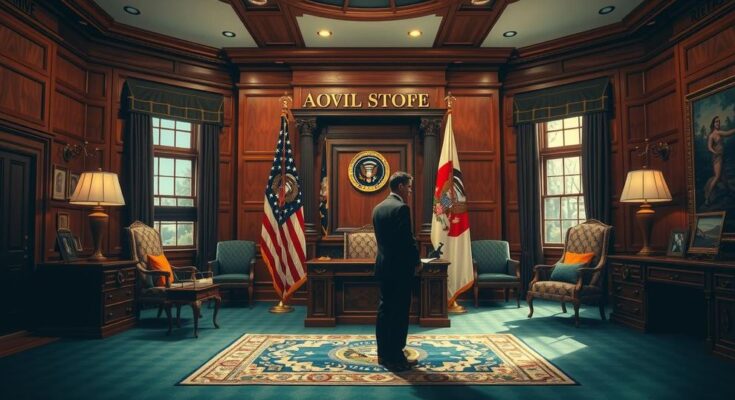During a White House meeting, President Trump confronted South African President Ramaphosa with footage he wrongly claimed showed white genocide in South Africa. Ramaphosa strongly refuted these allegations, highlighting the need for more accurate portrayals of his country’s situation. This tense exchange illustrates a broader issue concerning racial narratives and international perceptions.
In a recent episode during a meeting at the White House, South African President Cyril Ramaphosa faced significant challenges from United States President Donald Trump. The tension arose when Trump presented footage, falsely claiming it demonstrated evidence of systematic white genocide in South Africa. This moment escalated into a confrontational exchange in the Oval Office, as Ramaphosa refuted these accusations.
The incident highlights a growing fray in the dialogue surrounding racial issues in South Africa, particularly pertaining to land reform and the safety of white farmers. Ramaphosa, representing a diverse and complex nation, underscored the necessity of understanding the reality on the ground. He aimed to clarify that the narrative presenting South Africa as a hotspot for racial violence was misleading and unfounded.
This meeting was particularly striking as Trump had previously been criticized for his remarks on the situation in South Africa. During their encounter, Ramaphosa emphasized the importance of providing accurate information regarding the challenges and opportunities within his country. His comments reminded the world of the diversity of experiences and the nuances in South Africa’s socio-political landscape.
Reports indicate that the meeting included several moments of apparent frustration, heavily attributed to the stark differences in perspective on South Africa’s conditions. Trump’s reliance on what has been categorized as misinformation placed Ramaphosa in a position of having to defend the integrity of his government and the narratives surrounding racial matters in South Africa.
Following this public confrontation, observers noted that the implications of such exchanges can have wider ramifications, influencing both domestic and international perceptions of South Africa. The narrative of white genocide is often used by certain political groups to perpetuate fear, and this was illustrated clearly in the tense climate of their meeting.
As world leaders grapple with the complexities of racial dynamics, this incident serves as a reminder that dialogues surrounding race and land ownership continue to provoke heated debate. It also brings to light the urgent need for a more informed discourse that transcends sensationalized claims.
In summary, the recent meeting between Presidents Trump and Ramaphosa in the White House revealed significant tensions over false narratives regarding white genocide in South Africa. Ramaphosa’s insistence on addressing these misconceptions offered a necessary counter-narrative to the sensationalism often present in media discussions. As global leaders continue to navigate complex racial dynamics, such exchanges emphasize the importance of steering conversations toward factual understanding and constructive dialogue. The strained encounter underscores ongoing challenges in addressing race relations both in South Africa and internationally.
Original Source: www.theguardian.com




